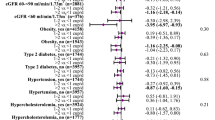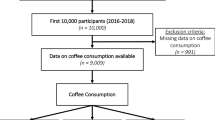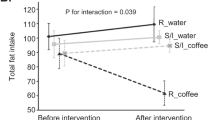Abstract
Objective:
To describe the associations between coffee consumption and glucose tolerance among elderly subjects.
Design:
A survey among an unselected non-institutionalized elderly population. Diabetes was assessed on the basis of self-reports and 2-h oral glucose tolerance test for the subjects on diet treatment or with normal glucose tolerance (NGT). Coffee consumption was assessed by a questionnaire.
Setting:
Three municipalities in Northern Finland Subjects: All non-institutionalized subjects with baseline normal glucose tolerance or impaired glucose tolerance (IGT) aged 70 years or over.
Main outcome measures:
Incidence, persistence or impairment of abnormal glucose tolerance (AGT).
Results:
Forty-two percent of those with NGT and 0–5 cups of coffee daily developed AGT, whereas the corresponding figure was 25% for those who drank more than five cups coffee daily. Fifty-five percent of the subjects with IGT or NGT who drank 0–5 cups coffee daily either persisted in IGT or developed AGT. The corresponding figure was 30% for those drinking more than five cups coffee daily. After adjustment for age, body mass index, cardiovascular disease, smoking, alcohol consumption and physical exercise, among those with NGT, the odds ratio (OR) for developing AGT was 2.3 for those drinking 0–5 cups compared to those drinking more than five cups of coffee daily (95% confidence interval (CI) 0.7–7.2). Correspondingly, low coffee consumption was the most powerful predictor associated with the persistence of IGT or the development of AGT (OR 2.9; 95% CI 1.2–6.9).
Conclusions:
Low coffee consumption predicts impairment of AGT or persistence of IGT among elderly subjects.
This is a preview of subscription content, access via your institution
Access options
Subscribe to this journal
Receive 12 print issues and online access
$259.00 per year
only $21.58 per issue
Buy this article
- Purchase on Springer Link
- Instant access to full article PDF
Prices may be subject to local taxes which are calculated during checkout
Similar content being viewed by others
References
Agardh EE, Carlsson S, Ahlbom A, Efendic S, Grill V, Hammar N et al. (2004). Coffee consumption, type 2 diabetes and impaired glucose tolerance in Swedish men and women. J Intern Med 255, 645–652.
Alberti JKG, Zimmett PZ, for the WHO consultation, Definition, diagnosis and classification of diabetes mellitus and its complications (1998). Part 1: Diagnosis and classification of diabetes mellitus. Provisional report of a WHO consultation. Diabetes Med 15, 539–553.
Feskens EJM (1992). Nutritional factors and the etiology on non-insulin-dependent diabetes mellitus: an epidemiological overview. World Rev Nutr 96, 1–39.
Hiltunen L, Läärä E, Keinänen-Kiukaanniemi S (1999). Changes in glucose tolerance during three years' follow-up in an elderly population. Public Health 113, 181–184.
Hiltunen L, Luukinen H, Koski K, Kivelä S-L (1994). Prevalence of diabetes mellitus in an elderly Finnish population. Diabetes Med 11, 241–249.
Hu FB, Manson JE, Stampfer MJ, Colditz G, Liu S, Solomon CG et al. (2001). Diet, lifestyle, and the risk of type 2 diabetes mellitus in women. N Engl J Med 345, 790–797.
Ohlson L-O, Larsson B, Björntorp P, Eriksson H, Svärdsudd K, Welin L et al. (1988). Risk factors for type 2 (non-insulin-dependent) diabetes mellitus. Thirteen and one-half years of follow-up of the participants in a study of Swedish men born in 1913. Diabetologia 31, 798–805.
Salazar-Martinez E, Willet W, Ascherio A, Manson J, Leitzman M, Stampfer M et al. (2004). Coffee consumption and risk for type 2 diabetes mellitus. Ann Intern Med 140, 1–8.
Tuomilehto J, Hu G, Bidel S, Lindstrom J, Jousilahti P (2004). Coffee consumption and risk of type 2 diabetes mellitus among middle-aged Finnish men and women. JAMA 291, 1213–1219.
Van Dam RM, Feskens EJ (2002). Coffee consumption and risk of diabetes mellitus. Lancet 360, 1477–1478.
Author information
Authors and Affiliations
Corresponding author
Rights and permissions
About this article
Cite this article
Hiltunen, L. Are there associations between coffee consumption and glucose tolerance in elderly subjects?. Eur J Clin Nutr 60, 1222–1225 (2006). https://doi.org/10.1038/sj.ejcn.1602441
Received:
Revised:
Accepted:
Published:
Issue Date:
DOI: https://doi.org/10.1038/sj.ejcn.1602441
Keywords
This article is cited by
-
Coffee consumption, obesity and type 2 diabetes: a mini-review
European Journal of Nutrition (2016)
-
Kaffee und Diabetes
Medizinische Klinik (2010)



